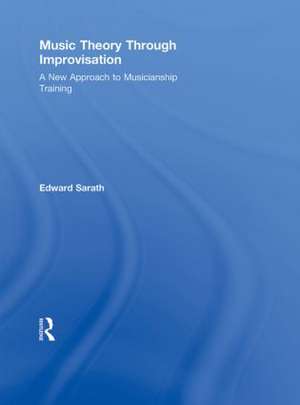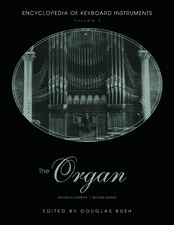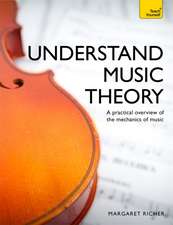Music Theory Through Improvisation: A New Approach to Musicianship Training
Autor Ed Sarathen Limba Engleză Hardback – 22 sep 2009
| Toate formatele și edițiile | Preț | Express |
|---|---|---|
| Paperback (1) | 358.11 lei 6-8 săpt. | |
| Taylor & Francis – 21 sep 2009 | 358.11 lei 6-8 săpt. | |
| Hardback (1) | 855.59 lei 6-8 săpt. | |
| Taylor & Francis – 22 sep 2009 | 855.59 lei 6-8 săpt. |
Preț: 855.59 lei
Preț vechi: 1145.09 lei
-25% Nou
Puncte Express: 1283
Preț estimativ în valută:
163.71€ • 170.95$ • 135.19£
163.71€ • 170.95$ • 135.19£
Carte tipărită la comandă
Livrare economică 15-29 aprilie
Preluare comenzi: 021 569.72.76
Specificații
ISBN-13: 9780415804530
ISBN-10: 0415804531
Pagini: 392
Ilustrații: 391 line drawings and Following Revisiting Music Theory
Dimensiuni: 210 x 280 x 23 mm
Greutate: 0.89 kg
Ediția:1
Editura: Taylor & Francis
Colecția Routledge
Locul publicării:Oxford, United Kingdom
ISBN-10: 0415804531
Pagini: 392
Ilustrații: 391 line drawings and Following Revisiting Music Theory
Dimensiuni: 210 x 280 x 23 mm
Greutate: 0.89 kg
Ediția:1
Editura: Taylor & Francis
Colecția Routledge
Locul publicării:Oxford, United Kingdom
Cuprins
Preface 1. Improvisation Across Boundaries: A Trans-stylistic Approach 2. Music Fundamentals: Key Signatures, Scales, Intervals, Modes, and Melodic Cells 3. Modality and Rhythm I: Time Feels 4. Modality and Rhythm II: Small Group Framework 5. Basic Tonal Materials: Triads and Seventh Chords 6. Harmonic Functions 7. Swing: Global Rhythmic Gateway 8. Melodic Line Construction and Harmonization 9. Chord Inversion Present and Past 10. Non-diatonic Harmony I: Applied Chords 11. Non-diatonic Harmony II: Modal Mixture 12. Figured Bass Realization at the Keyboard 13. Extended Chords 14. Altered Extensions 15. Diverse Approaches to Analysis 16. Further Creative Horizons in Jazz Improvisation and Composition Appendix 1. Introduction to Species Counterpoint Appendix 2. Overtone Series and Equal Temperament Appendix 3. Rhythmic Exercises Appendix 4. Jazz Etudes Appendix 5. Additional Keyboard Exercises Appendix 6. Instrument Ranges, Transposition, and Score Excerpts Appendix 7. Aural Transposition Appendix 8. Sample Syllabus Appendix 9. CD and Web Audio Tracks
Notă biografică
Edward W. Sarath is Professor of Music and Chair for the Department of Jazz and Improvisation Studies at the School of Music, Theatre, and Dance at the University of Michigan.
Descriere
Designed for Music Theory courses, Music Theory Through Improvisation presents a unique approach to basic theory and musicianship training that examines the study of traditional theory through the art of improvisation. The book follows the same general progression of diatonic to non-diatonic harmony in conventional approaches, but integ







![Write Songs from Scratch [With CD (Audio)]](https://i1.books-express.ro/bt/9780851623511/write-songs-from-scratch-with-cd-audio.jpg)

